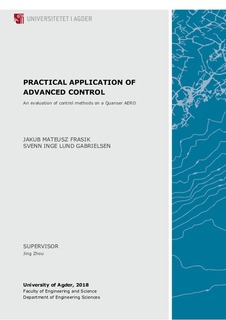PRACTICAL APPLICATION OF ADVANCED CONTROL : An evaluation of control methods on a Quanser AERO
Master thesis
Permanent lenke
http://hdl.handle.net/11250/2563895Utgivelsesdato
2018Metadata
Vis full innførselSamlinger
Sammendrag
In the past years, rotorcraft have received much attention in our society. These provide
great accessibility and are utilized in many areas of application. The complex dynamics of
rotorcraft make them di cult to control, and the applications demand stable, safe, and agile
devices. This thesis investigates the use of advanced control methods and evaluates their
e ectiveness using a 2DOF (pitch and yaw) '
ight control experiment-platform'; the Quanser
AERO.
The main goal of the project is development and evaluation of angular-position controllers
for the AERO, using conventional and advanced control theory. This includes cascade P-PI,
LQR state-feedback, MPC and MRAC. The controllers are tested in simulation using linear
and nonlinear models, and implemented for control of the AERO.
The performance of each controller is evaluated in a standardized test. This test is
combined step response sequence for pitch and yaw axes. The performance of each controller
is evaluated through a performance index, which is based on the squared tracking error
between command signal and plant output.
This project has shown that model based controllers like LQR and MPC works well when
tuned to a speci c case (for both simulation and practical application), but the performance
crumbles when the system is changed without changes to the controller parameters. The
simulation of control of a linear system for the conventional controller and MRAC gave
excellent results, which con rms that the controllers work well in theory. When it comes
to practical application, the conventional controller continues to work relatively well. The
MRAC, however, shows strange behaviour, which was not anticipated. The results give
insight to the practical application of advanced controllers, and inspires further research into
the subject.
Beskrivelse
Master's thesis Mechatronics MAS500 - University of Agder 2018

